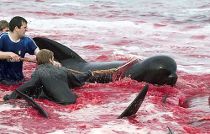Could commercial whaling finally be slowing down?
After decades of intense effort from activists to stop the killing of whales as a food source, industry demand may finally be doing the job for them as the popularity of whale meat plummets.

After decades of intense effort from activists to stop the killing of whales as a food source, industry demand may finally be doing the job for them as the popularity of whale meat plummets.
The announcement comes as the largest blue fin tuna fish ever caught was auctioned in a Japanese market for UK£250,000. The sale of the tuna represents the popularity of blue fin tuna in Japanese cuisine, finally taking the focus off whale meat.
As illegal commercial whaling has been thrust into the spotlight, due to Oscar winning films such as The Cove, there has been a sharp rise in awareness and criticism of global whaling practices, especially among the Japanese.
Whale meat is sold openly in Japanese markets. The whales are caught by a fleet of government supported ships that operate under the guise of conducting experiments for Japan's Institute of Cetacean Research.
Commercial whaling has continued in many nations even though the International Whaling Commission (IWC) passed a memorandum in 1986 theoretically banning commercial killing of small cetaceans, while allowing research based killings.
Japan has been allowed to set its own quota of the amount of cetaceans it is allowed to kill, and annually kills 940 Minke whales and 10 Fin whales.
However, since the non governmental organisation (NGO) Sea Shepherd Conservation Society has been following the Japanese Government's every move, this figure has dropped dramatically and so has the popularity of the meat, with some markets experiencing huge waste.
Japan is not the only country involved in this cruellest of sports. Norway, Iceland and the Faroe Islands continue to kill whales. The Faroe Islands are one of the worst commercial killers as they are exempt from the IWC's memorandum, as it doesn't extend to the whales in their area.
The Faroe Islands slaughter approximately 1,000 Long-finned pilot whales per year, in a tradition supervised by local authorities. The Faroe Islanders say that they use the whale meat as a healthy abundant food supply, and that traders do not sell the meat for a profit.
Fortunately for the whales, the islands chief medical officer, in 2008, discovered that the meat had high levels of mercury and other toxins in levels that are too high for human consumption and could cause life threatening illnesses.
While this helped decrease the level being eaten in the Faroe Islands, the discovery did not stem the killing rate in other nations, who continue to eat the whale meat.
Author: Charity Knight | Climate Action
Image: ladylara (Laura Balc) | flickr






